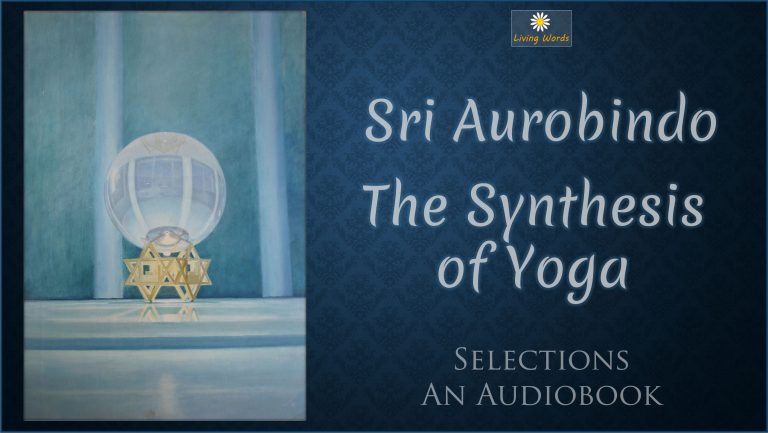Accepting life, he has to bear not only his own burden, but a great part of the world’s burden too along with it, as a continuation of his own sufficiently heavy load. Therefore his Yoga has much more of the nature of a battle than others ....
At the Feet of The Mother
Selections from The Synthesis of Yoga
Selections from “The Synthesis of Yoga” by Sri Aurobindo
Total duration 3 hrs 42 minutes, recorded by Gopal Naik.
AUDIO PLAYER: listen to all tracks at once HERE
AUDIO ARCHIVE: download all tracks at once HERE
POSTS with audio and text of each selection are below
A wide massive opening, a harmonised concentration of the whole being in all its parts and through all its powers upon the One who is the All is the larger action of this Yoga without which it cannot achieve its purpose.
... the wise have always been unwilling to limit man’s avenues towards God; they would not shut against his entry even the narrowest portal, the lowest and darkest postern, the humblest wicket-gate. Any name, any form, any symbol, any offering has been held to be sufficient if there is the consecration along with it
This craving life-force or desire-soul in us has to be accepted at first, but only in order that it may be transformed. Even from the very beginning it has to be taught to renounce all other desires and concentrate itself on the passion for the Divine.
Our purpose in Yoga is to exile the limited outward-looking ego and to enthrone God in its place as the ruling Inhabitant of the nature. ... This, not an exaggerated or even a sublimated energy of human intellect and action, is the type of the superman whom we are called to evolve by our Yoga.
To live in God and not in the ego [...] to feel God in all, oneself in all. [...] To act in God and not in the Ego.
Our sacrifice is not a giving without any return or any fruitful acceptance from the other side; it is an interchange between the embodied soul and conscious Nature in us and the eternal Spirit [...] The soul knows that it does not give itself to God in vain...
All our actions, not less the smallest and most ordinary and trifling than the greatest and most uncommon and noble, must be performed as consecrated acts. [...] Our commonest or most grossly material actions must assume this sublimated character; when we eat, we should be conscious that we are giving our food to that Presence in us; it must be a sacred offering in a temple ....
Whatever we see and hear, whatever we touch and sense, all of which we are conscious, has to be known and felt by us as That which we worship and serve; all has to be turned into an image of the Divinity, perceived as a dwelling-place of his Godhead ....
Nothing must be attempted for ourselves as a separate existence; nothing done for others, whether neighbours, friends, family, country or mankind or other creatures merely because they are connected with our personal life and thought and sentiment or because the ego takes a preferential interest in their welfare.
For all must be done as a sacrifice, all activities must have the One Divine for their object and the heart of their meaning [...] The Yogin’s aim in the practical sciences ... should be to enter into the ways of the Divine and his processes [...] The Yogin’s aim in the Arts should not be a mere aesthetic, mental or vital gratification, but, seeing the Divine everywhere...
"Its action is like a searchlight showing up all that has to be changed in the nature; it has in it a flame of will insistent on perfection, on an alchemic transmutation of all the inner and outer existence. It sees the divine essence everywhere but rejects the mere mask and the disguising figure. It insists on Truth, on will and strength and mastery, on Joy and Love and Beauty..."
But the most intimate character of the psychic is its pressure towards the Divine through a sacred love, joy and oneness. It is a divine Love that it seeks most, it is the love of the Divine that is its spur, its goal, its star of Truth ...
"... the worship of the god, the worship of the idol, the human magnet or ideal are not to be despised; for these are steps through which the human race moves towards that blissful passion and ecstasy of the Infinite"
This thing which is evil now and in its present shape must be abandoned was once helpful and necessary to the general and individual progress. That other thing which we now regard as evil may well become in another form and arrangement an element in some future perfection. And on the spiritual level we transcend even this distinction
The perfect supramental action will not follow any single principle or limited rule [...] Its sole aim will be the expression of the divine in us and the keeping together of the world and its progress towards the Manifestation that is to be.
Whoever sincerely enters the path of works, must leave behind him the stage in which need and desire are the first law of our acts. For whatever desires still trouble his being, he must, if he accepts the high aim of Yoga, put them away from him into the hands of the Lord within us.
... even before that highest approach to identity is achieved, something of the supreme Will can manifest in us as an imperative impulsion, a God-driven action; we then act by a spontaneous self-determining Force but a fuller knowledge of meaning and aim arises only afterwards.


